Yalta. The name is synonymous with deception and betrayal. Yalta continues to endure as one of the greatest controversies of our time. For decades Western leaders, political analysts, academia, and journalists have been grappling with facts, half truths, lies and conjecture in the struggle to untangle the most baffling imbroglio of the twentieth century. Today it becomes ever more urgent to understand the lessons of Yalta and re-examine the events that led to the Cold War.
The Yalta Conference, one of a series of summit meetings during World War II, was convened at the Livadia Palace in the Crimea from February 4 to February 11, 1945. In the span of seven days the "Big Three" - President Franklin D. Roosevelt, Prime Minister Winston Churchill, and Marshall Josef Stalin, agreed upon the configuration of a post-war Europe, and sealed it's fate and that of the world for the next 47 years.
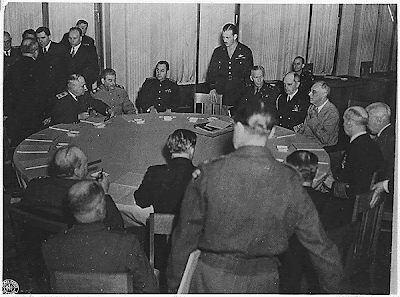 |
| Yalta Conference February 4, 1945 Stalin, Roosevelt, Churchill and others |
The meetings concluded with a set of protocols that dealt with a number of issues, including the unconditional surrender of Nazi Germany, the declaration of a liberated Europe, the restoration of sovereignty and self-determination to countries that had been occupied by Nazi Germany; the establishment of order and the rebuilding of national economies. The allies agreed to impose severe punitive damages against Germany that would be exacted by the payment of billions of dollars in reparations, the subjugation and dismemberment of the German state and military, and the establishment of allied zones of occupation therein to ensure future world peace and security.
Foremost in the Yalta agreement was the imperative of creating the United Nations organization based on the principles espoused by Roosevelt and Churchill in the Atlantic Charter signed in August 1941. It sought to establish world security and commit nations to "respect the right of all people's to choose the form of government under which they will live and....to see sovereign rights and self-government restored to those who have been forcibly deprived of them...". The inclusion of these conditions in the Yalta Protocol was an absurdity, because by the time the Conference took place, the Red Army already occupied much of Eastern Europe and constituted a military force that was three times the size of the Allied forces positioned in the West.
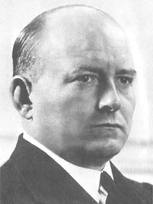 |
| PM Stanislaw Mikolajcyk |
Mikolajcyk continued to protest the Soviet occupation unaware that Poland had already been ceded to Stalin. His persistence caused considerable annoyance to Churchill and he berated Mikolajcyk for his refusal to surrender to Stalin's wishes. But it was all fait accompli.
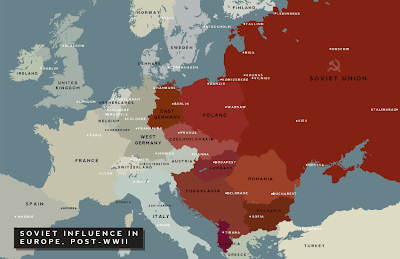 |
| Post-World War II Map of Soviet Influence in Europe |
It was within this framework that Churchill and Roosevelt sought assurances from Stalin for a future Polish state. However the resulting Protocol was disturbing in its ambiguity. Though Stalin agreed to a future Polish government, he insisted that it would be based on the already existing Soviet-controlled Polish Provisional Government but he assured them that such government would be reorganized along a broader "democratic" basis by the inclusion of democratic leaders from Poland itself, and from Poles abroad" and that he would allow the "free and unfettered elections as soon as possible on the basis of universal suffrage and secret ballot." What eventually transpired would shock and outrage the world.
The agenda also included the question of Poland's post-war borders yet the matter had already been settled surreptitiously at theTeheran Conference in 1943. Stalin insisted that the Polish eastern border be determined by the Curzon Line which would result in the dissection of a third of Poland's territory. A secret meeting had been arranged at which Roosevelt unilaterally ceded Polish territory to Stalin in exchange for assurances that Russia would ally itself with the US in the Pacifc War. The deal was done without Churchill having known about it beforehand.
Incidentallly, during the Yalta Conference Roosevelt had taken many an occasion to snub Churchill perhaps in an attempt to improve his own bargaining position with Stalin.Churchill was bullied and mocked mercilessly. It was a spectacle of ridiculous proportions and one which achieved nothing other to amuse Stalin immensely. The rift that existed between Roosevelt and Churchill did nothing to strengthen their resolve against Stalin.
The Yalta agreement was hailed around the world as a resounding success. Reminiscent of Chamberlain's triumphant return to London after the Munich Agreement in 1938, Churchill was welcomed with similar fanfare when he returned to London after Yalta. Lord Beaverbrook, an enduring friend lavished Churchill with praise fit for a hero saying, "You now appear to your countrymen to be the greatest statesman as well as the greatest warrior."
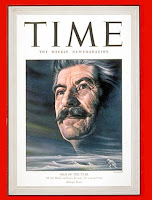 |
| Time Magazine Stalin Man of the Year |
From the moment that the Soviet Union became an ally, the British and American propaganda machine went into full swing. In January 1943 Time Magazine released its issue featuring Josef Stalin as Man of the Year. The ensuing article praised him for his "tough guy" approach because it "brought results".
In March 1943 Life Magazine devoted an entire issue glorifying the Russian Soviet leadership, proclaiming that Lenin was "perhaps the greatest man of modern time". They even suggested that the FBI was fundamentally comparable to that of the NKVD. American media made every effort to draw similarities between the Americans and the Russians, and declared that the Soviets are "just like us". They "look like Americans", "dress like Americans" and "think like Americans".
Even Hollywood got in on the act and produced about a dozen pro-Soviet films, such as "Mission to Moscow", "Counterattack", "Song of Russia", "Days of Glory", "The North Star", and "The Battle of Russia" just to name a few. "Mission to Moscow" was made upon the request of President Roosevelt. The producer of the film, Robert Buckner referred to the production as "an expedient lie for political purposes". It portrayed the Soviet Union along the lines of an American style democracy in the attempt to whitewash the American public. But most disturbing thing of all was that at the heart of the American psyche was the genuine conviction that any "anti-Soviet" sentiment was considered inflammatory and anti-American. The propaganda was successful.
Even the British public was mislead about the true nature of the Soviet leader and did not consider Russia a threat. The British and Americans desperately needed the Russians if they were to defeat Nazi Germany. Churchill went so far as to openly criticize the Polish government-in-exile for its refusal to cultivate "friendly relations" with Russia, implying that Poland was the real "enemy" and as a result was made an outcast.
Churchill and Roosevelt considered the Soviet Union a valuable ally and took every opportunity to portray the Soviet leader as an amiable bearer of democratic freedoms and peace. In their effort to paint a rosy picture of their alliance with the Soviet Union, they even referred to Stalin as "Uncle Joe" however they both tread very carefully in an effort not to antagonize Stalin nor cause him any public embarassment or offense.
Roosevelt provided Stalin with considerable financial support as part of the Land Lease Agreement. In the period from 1941 to 1945, the United States shipped about $11.3 billion worth of supplies to the Soviet Union. (The US also shipped goods to other allies worth, $31 billion to Britain, $3 billion to France and slightly over $1 billion to China. The total expense to Americans was $50 billion, the equivalent of $611 billion today.) In addition the USSR received with more than 2,000 locomotives, 11,000 railcars, and 18,700 aircraft. By 1945, over two-thirds of trucks utilized by the Red Army came from the United States. Incidentals were also shipped to Russia, such telephone cable, aluminum, canned rations, and clothing. In return, Roosevelt wanted Stalin's support in the Pacfic War.
It was not long until news leaked out about the truth of the Yalta accords, and that Roosevelt and Churchill had sold out to Stalin's demands. (Other secret deals included, at Stalin's insistence, US recognition of Port Arthur, of Mongolian independence from China, of Soviet interests in the Manchurian railway, as well as special voting rights for the Soviet members of the United Nations Security Council.) The British House of Commons was in an uproar over the deal about Poland, and anxious about the possible consequences. In a blistering speech in the House of Commons MP Dunglass denounced Churchill for the "transfer to another power the territory of an ally" and that Churchill failed to permit the Polish government to have "the full right to choose their own government free from the influence of any other power." The following day twenty-five MP's who opposed the Yalta agreement introduced an amendment to the vote of confidence. However, the amendment was defeated by a landslide: 385 votes against, and 11 abstained. Only 25 votes were in favor.
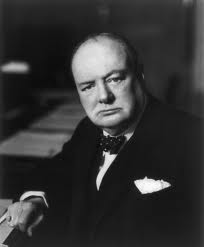 |
| PM Winston Churchill |
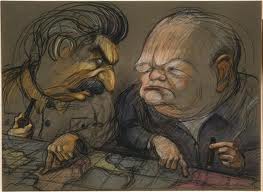 |
| Stalin and Churchill caricature |
In reality Churchill had long been a harsh critic of communism and thoroughly despised Stalin and his regime. He was well informed about Stalin's murderous campaigns, the endless purges, the slaughter that lay in wake of the Red Army, in particular their hand in the massacre of thousands of Polish Officers at Katyn in 1940. Most heinous was the betrayal of the Poles during the Warsaw Uprising in 1944. At the crucial moment when the Polish Army most expected help from the Russians, the Soviet Red Army stopped at the banks of the Vistula River and merely watched and waited while the Nazis were slaughtering the Poles. It was all the more shameful because Churchill and Roosevelt refused to help the Polish Home Army despite their frantic pleas for assistance. Churchill imposed a media ban to prevent these facts from being public knowledge. After the defeat of the Warsaw Uprising, Churchill met with the Polish Prime Minister in Moscow, turned to him and uttered these words: "The Russians will sweep through your country and your people will be liquidated. You are on the verge of annihilation."
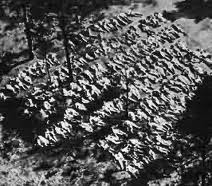 |
| Katyn Massacre - (Russia) 16,000 Polish officers were executed by Soviet NKVD |
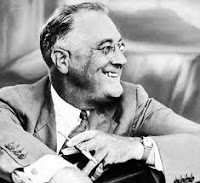 |
| Franklin D. Roosevelt |
During the Yalta meetings, Roosevelt sent a letter to Stalin (dated February 6, 1945) in which he tried to persuade him to make reasonable concessions in regard to a future Polish government otherwise it would have put the three of them in a "bad light throughout the world", that is, Stalin recognized one government "while we and the British are recognizing another in London".
Soon after the conclusion of the Yalta conference, and three weeks before his death, Roosevelt came to the startling realization that he had failed miserably, and that his advisors had been right all along. He admitted that "Averell is right. We can't do business with Stalin. He has broken every one of the promises he made at Yalta.". Averell Harriman, US Ambassador to the Soviet Union, had accompanied Roosevelt to Yalta and encouraged the President to take a tougher position against Stalin, in defense of the Polish question.
In a Top Secret White House memorandum dated May 11, 1945, William Leahy, Chairman of the US Joint Chiefs of Staff relayed a message to the U.S. Secretary of State which Churchill had dispatched to Foreign Secretary Anthony Eden. In it Churchill advised Eden of the urgency of resolving the Polish problem, and expressed grave concern over European security should American troops withdraw too quickly. The following is a reproduction of this two page document in its entirety.
Churchill expressed concern over what he termed the "Polish deadlock", worried about the impending tide of Soviet expanisionism and the fear that Poland would be "completely engulfed and buried deep in Russian-occupied lands". But in the wake of the Yalta conference these concerns were swept aside and replaced by the single determination to win the war whatever the cost.
Churchill was a highly skilled orator who also demonstrated exceptional dramatic license. Memos such as that presented above served only to perpetuate his masquerade, a tactic which was well timed. His gesture of trying to salvage European security and rescue Poland at the last moment could only assure that Churchill's political intregrity and legacy would remain unscathed.
Roosevelt was never particularly interested in the "Polish problem". His main preoccupation in 1944 was winning another Presidential term. On October 11, 1944 he invited the members of the Polish American Congress to the White House. It was a perfect photo opportunity. Behind the President was a huge map of Poland on the wall illustrating the demarcation of its eastern border along the Riga Line rather than the Curzon Line. In an effort to win the trust and support of Polish Americans, Roosevelt concealed the truth about Yalta, and assured the Polish delegation that they could depend on the friendship of the US government. Roosevelt won their vote easily all with few words and a big map.
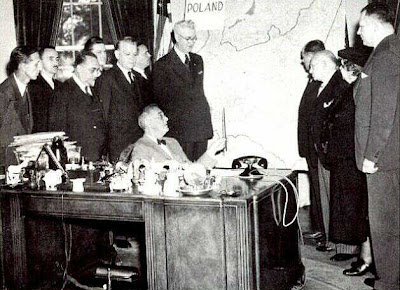 |
| President Franklin D. Roosevelt and members of Polish American Congress |
IMMEDIATE REPERCUSSIONS OF YALTA
In March 1945, Stalin demonstrated his compliance with the terms of Yalta by inviting Polish leaders from abroad to form the new Polish Government of National Unity (TRJN). But upon their arrival, they were immediately arrested by the Soviet NKVD. Though Prime Minister Mikolajcyk joined a few others to co-operate in this new government, they were all betrayed.
By June of that year, the new coalition government was organized, and consisted of members of the Polish government-in-exile, and those of Polish Communist Party. But Stalin made certain that none of the old guard possessed any real power.
Stalin's promise for "free and unfettered elections" never materialized. The communists used repression, bribery, threats, and even murder of opposition members to consolidate their power. An "election" was held only when the communists were certain to obtain majority support. No British nor American observers were permitted to attend. Prime Minister Mikolajcyk had no choice but to resign.
The Polish government-in-exile did not recognize the TRJN - neither did the Vatican. But surprisingly on July 5th, 1945, the United States gave the TRJN full recognition, which soon after was followed by France and the United Kingdom. By October of that year delegates of TRJN signed the United Nations Charter, and Soviet Poland became a full member of the United Nations. In retrospect the events leading up to the demise of Poland's sovereignty had all the makings of a coup d'etat. Stalin was a master puppeter, and Churchill and Roosevelt were his puppets.
By August 16, 1945 the controversy over the Curzon line was finally settled, albeit by questionable and devious means. The "Soviet" Polish government agreed to cede its eastern territories to the Soviet Union and officially recognized the Curzon Line as its eastern border.
Throughout this episode the Soviet NKVD embarked on a massive man-hunt to capture Polish soldiers of the Armia Krajowa. Polish fighters were arrested, tortured and hanged. Thousands more Poles were deported to remote camps in the Russian gulag. Polish troops which had helped the Red Army drive the Germans out of Lwow, Wilno and Lublin were summarily executed. Sixteen prominent leaders of the Polish underground were arrested and killed after having been subjected to a mock trial. The NKVD was able to track them down only because British Foreign Minister Athony Eden gave Stalin the list of names.
CONCLUSION
With the fall of the Iron Curtain and the end of the Cold War there is a resurgence of interest in the events of the Yalta Conference and a re-examination of the causes of the Cold War. The controversy still continues to plague us and questions arise as to which side was actually responsible for the start of the Cold War, and precisely when? Were the Americans responsible, or the Soviets? Is there anything that Churchill and Roosevelt could have done to prevent it's escalation and how? Many in the West continue to defend the legacy of Roosevelt and Churchill, insisting that they innocently fell victim to Stalin's chicanery. It is imperative that we look at the cold, hard facts before we can formulate objective conclusions.
Now that the Cold War is over, Russia is an equal among democratic nations. Communism, its ideology and fanaticism has melted away giving rise to the anticipation of a more peaceful co-existence. No matter. Rivalries will continue to exist irregardless of the catalyst, be it ideological, cultural, or political. On February 27, 1945 Churchill addressed the House of Commons about the Crimea Conference, in which he stated, "It is a mistake to look too far ahead. Only one link in the chain of destiny can be handled at a time." He was sorely mistaken. It is vital to the future peace and security of the world that international agreements entered into with friendly nations (or adversaries) take into account the long-term ramifications. Quick fixes do not work. The Yalta Conference proved it.


Thank you for this information. My father was Polish and a survivor of Russian gulag. He spoke very little about his war experience. He had no words to describe it he and suffered a very damaged life afterwards and this is helping me to piece his life together. Before he died in 1993 he gave me a piece of paper with the words 'Massacre at Katyn' written on it. He had no words to describe it. Your site is helping me to put the pieces together. Dziekuje bardzo.
ReplyDeleteThank you for sharing your personal story. I am very moved by your comments and wish to encourage you to continue and to widen your search for the truth. I hope that you will be able to put the pieces together. May the soul of your dear father rest in eternal peace and may God Bless you.
DeleteDespite all political politeness and talk of understanding and allied unity if a leader cannot support his claim with enough tanks and soldiers his words would remain words. Stalin had effectively outplayed and outgunned both Americans and British at Yalta. This simple fact makes all the grounds for demonizing him, including the blood and suffering of people of coarse.
ReplyDeleteHowever in Yalta Stalin managed to add to Polish territory former German provinces, and erase threat of Poland being attacked from former Prussia (Konigsberg) and mainland Germany. This border remains de-facto to this day, and in a cynical way solves the old quarrels with Germany, as well as eliminating possibility of another blitz.
And if you look at who wanted to start the WW2 you brought the numbers yourself: America was in great depression before the war, but thanks to slaughter managed to boost its production and other industries, put most of the Europe under its debt scheme, and by retaining Cold war later keep this status-quo for half a century. Despite the great German nationalism they just did a dirty job of "Europe's bad guy". The Versailles treaty could not create anything else, only retaliation. This actually was understood by Germans at the end of WW1, as their planners made preparation and plans form the next war in 1918.
One of consequences of Yalta today is Kaliningrad and that part of Russia that they can use now to sand rockets from, to terrorize rest of Europe.This is old polish territory that was under control of Prussia,and Kaliningrad was name Krolewiec a town of high level of culture were more books were published than rest of Poland. It is total shame that Stalin conspire together with Hitler how to attack Poland in 1939 and in Yalta he gets rewarded.After 1939 Nazi Germany and Soviet Union campaign against Poland, polish soldiers end up fighting for freedom an all fronts wherever there was fighting going on.From Norway to Africa and from England all the way to far east.And how many polish pilots was fighting over England end fling missions over Germany and how many of them lost their lives.Best polish soldiers could not even go back to Poland after the WWII in fear of prosecution by NKWD like those who did come back.So it is total shame on behave rest of the World for how Poland was traded and all because allied leaders who were involved in negotiations with Stalin could not look far in the future what kind of consequences their negotiations will have on Europe and rest of the world.
ReplyDeleteRoosevelt was a spoiled rich boy playing at president.Churchill operated only to serve the interests of Britain only. Using other countries to further British interests was a game he played for decades. Stalin, the ruthless and murderous thug found these two "leaders" easy pickings for his single minded goal of enslaving all of central Europe especially Russia's ancient rival Poland. The betrayal by Roosevelt and Churchill could not have been more complete.
ReplyDeleteNo question Roosevelt and Churchill betrayed Poland at Yalta. Roosevelt was a spoiled rich boy playing President. Churchill made a career of manipulating other countries to further the needs of the British Empire. Stalin was a murderous thug with a single goal of enslaving central Europe, especially Russia's ancient rival Poland with communism.The west's two "politicians" were no match for a single minded dictator.
ReplyDeleteThank you Poland ☺️🇯🇵🇵🇱🌸
ReplyDelete